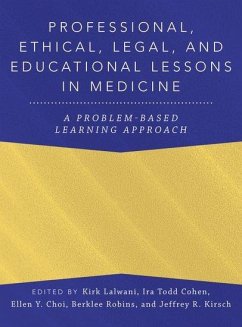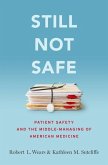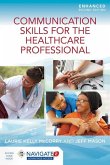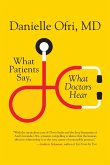Kirk Lalwani, Ira Todd Cohen, Ellen Y Choi, Berklee Robins, Jeffrey Kirsch
Professional, Ethical, Legal, and Educational Lessons in Medicine
A Problem-Based Learning Approach
Kirk Lalwani, Ira Todd Cohen, Ellen Y Choi, Berklee Robins, Jeffrey Kirsch
Professional, Ethical, Legal, and Educational Lessons in Medicine
A Problem-Based Learning Approach
- Gebundenes Buch
- Merkliste
- Auf die Merkliste
- Bewerten Bewerten
- Teilen
- Produkt teilen
- Produkterinnerung
- Produkterinnerung
With a diverse set of over 70 cases, quizzes, and a problem-based learning approach, this volume expertly provides an interactive and in-depth learning experience for any medical professional.
Andere Kunden interessierten sich auch für
![Surrender- A Soldier's Legal, Ethical, and Moral Obligations; With Philippine Case Study Surrender- A Soldier's Legal, Ethical, and Moral Obligations; With Philippine Case Study]() Matthew S. KlimowSurrender- A Soldier's Legal, Ethical, and Moral Obligations; With Philippine Case Study62,99 €
Matthew S. KlimowSurrender- A Soldier's Legal, Ethical, and Moral Obligations; With Philippine Case Study62,99 €![An Introduction to Ethical, Safety and Intellectual Property Rights Issues in Biotechnology An Introduction to Ethical, Safety and Intellectual Property Rights Issues in Biotechnology]() Padma Nambisan (Professor, Department of Biotechnology, Cochin UnivAn Introduction to Ethical, Safety and Intellectual Property Rights Issues in Biotechnology74,99 €
Padma Nambisan (Professor, Department of Biotechnology, Cochin UnivAn Introduction to Ethical, Safety and Intellectual Property Rights Issues in Biotechnology74,99 €![For the Common Good For the Common Good]() Alex John London (Clara L West Professor of Ethics and PhilosophyFor the Common Good150,99 €
Alex John London (Clara L West Professor of Ethics and PhilosophyFor the Common Good150,99 €![Rationing and Resource Allocation in Healthcare Rationing and Resource Allocation in Healthcare]() Rationing and Resource Allocation in Healthcare67,99 €
Rationing and Resource Allocation in Healthcare67,99 €![Still Not Safe Still Not Safe]() Robert Wears (Professor of Medicine, Professor of Medicine, UniversStill Not Safe42,99 €
Robert Wears (Professor of Medicine, Professor of Medicine, UniversStill Not Safe42,99 €![Communication Skills for the Healthcare Professional, Enhanced Edition Communication Skills for the Healthcare Professional, Enhanced Edition]() Laurie Kelly McCorryCommunication Skills for the Healthcare Professional, Enhanced Edition83,99 €
Laurie Kelly McCorryCommunication Skills for the Healthcare Professional, Enhanced Edition83,99 €![What Patients Say, What Doctors Hear What Patients Say, What Doctors Hear]() M.D., Danielle Ofri,What Patients Say, What Doctors Hear22,99 €
M.D., Danielle Ofri,What Patients Say, What Doctors Hear22,99 €-
-
-
With a diverse set of over 70 cases, quizzes, and a problem-based learning approach, this volume expertly provides an interactive and in-depth learning experience for any medical professional.
Hinweis: Dieser Artikel kann nur an eine deutsche Lieferadresse ausgeliefert werden.
Hinweis: Dieser Artikel kann nur an eine deutsche Lieferadresse ausgeliefert werden.
Produktdetails
- Produktdetails
- ANESTHESIOLOGY A PROBLEM-BASED LEARNING
- Verlag: Oxford University Press Inc
- Seitenzahl: 472
- Erscheinungstermin: 17. September 2024
- Englisch
- Abmessung: 290mm x 226mm x 30mm
- Gewicht: 1340g
- ISBN-13: 9780197655979
- ISBN-10: 0197655971
- Artikelnr.: 67734560
- Herstellerkennzeichnung
- Libri GmbH
- Europaallee 1
- 36244 Bad Hersfeld
- gpsr@libri.de
- ANESTHESIOLOGY A PROBLEM-BASED LEARNING
- Verlag: Oxford University Press Inc
- Seitenzahl: 472
- Erscheinungstermin: 17. September 2024
- Englisch
- Abmessung: 290mm x 226mm x 30mm
- Gewicht: 1340g
- ISBN-13: 9780197655979
- ISBN-10: 0197655971
- Artikelnr.: 67734560
- Herstellerkennzeichnung
- Libri GmbH
- Europaallee 1
- 36244 Bad Hersfeld
- gpsr@libri.de
Dr. Lalwani graduated from St. John's Medical College, India, and completed his residency training in Anesthesia and Critical Care at the Norwich, King's College, and Royal London Hospitals in London, UK. He completed his pediatric anesthesiology fellowship at Great Ormond Street Hospital in London, completed his Specialist Training in Anesthesia in the UK, then worked at Seattle Children's Hospital for two years before joining OHSU in 1999. He is a fellow of the Royal College of Anaesthetists and is Board Certified in Anesthesiology and Pediatric Anesthesiology by the American Board of Anesthesiology. Dr. Cohen graduated from New York University's School of Medicine in 1983. He completed a Pediatric Residency at the Albert Einstein Affiliated Hospitals in 1986, an Anesthesiology Residency at New York University in 1988 and a Fellowship in Pediatric Anesthesiology at Children's National in Washington, D.C. in 1989. Upon completion of his clinical training, he joined the Department of Anesthesiology at Children's Hospital of Pittsburgh for four years and then returned Children's National. In 2005, Dr. Cohen earned a master's degree from the George Washington University, School of Education and Human Development. He has over the years served as Fellowship Program Director, President of the Society of Education, and Chair of the Committee for Continuing Education for the Society of Pediatric Anesthesia. Dr. Ellen Choi received her BA in molecular and cell biology from the University of California, Berkeley, and earned her MD from the University of California, San Francisco. She completed her residency training in anesthesiology at the University of California, Los Angeles, where she also served as chief resident. She then completed a pediatric anesthesiology fellowship at Boston Children's Hospital in 2011. After fellowship, she returned to UCLA as faculty before joining the University of Chicago. She is board certified in Anesthesiology and Pediatric Anesthesiology by the American Board of Anesthesiology. Dr. Robins graduated from the Mount Sinai Scholl of Medicine (now Icahn School of Medicine at Mount Sinai, New York, NY), in 1989, following undergraduate study in Biology and Philosophy at the University of Rochester (Rochester, NY). He completed his Anesthesiology residency at Stanford University (Stanford, CA) in the Department of Anesthesiology, followed by a Fellowship in Pediatric Anesthesiology at The Boston Children's Hospital/Harvard University (Boston, MA), where he served as Chief Fellow. After a year on faculty at Vanderbilt University (Nashville, TN), he joined the faculty at OHSU in 1996. In 2016, he completed a Master's Degree in Bioethics and Health Policy at Loyola University Chicago (Chicago, IL). Additional training in Pediatric Bioethics was completed at Children's Mercy Hospital (Kansas City, MO) in 2017. He has co-taught graduate-level Pediatric Bioethics at Loyola University Chicago and has served on both the Ethics Consult Service and the Institutional Ethics Committee at OHSU. He is Board Certified in Anesthesiology and Sub-Specialty Certified in Pediatric Anesthesiology from the American Board of Anesthesiology. Dr. Kirsch completed his residency in anesthesiology and fellowships in neuro-anesthesiology and neuro-critical care at Johns Hopkins. During his 20 years of service at Hopkins, he was vice chair of Education and Training and the residency program director. Dr. Jeffrey Kirsch is Chair-Emeritus of the Department of Anesthesiology and Perioperative Medicine at Oregon Health & Science University. He also served as a member of the ACGME Review Committee for Anesthesiology and currently is a member of the ACGME Board of Directors. Dr. Kirsch is Past President of SNACC, the Society of Associations of Academic Anesthesiology and Perioperative Medicine, and Association of University Anesthesiologists. He currently serves the ASA as Chair of the Committee on Scientific Advisory and their representative to the Anesthesiology Research Council.
* Preface
* Acknowledgments
* 1. Navigating Communication Conflicts
* 2. The Disruptive Colleague
* 3. The Challenging Resident
* 4. Substance Abuse in Healthcare Providers
* 5. Addressing Patient Nonadherence
* 6. Professional Boundaries in Healthcare
* 7. Addressing Workplace Violence in Interprofessional Teams
* 8. Avoiding Implicit Bias and Microaggressions
* 9. Stress and Burnout in Healthcare
* 10. Developing a Culture of Wellness
* 11. Surviving a Bad Outcome: The Second Victim
* 12. Disclosure of Medical Errors
* 13. Professional Pitfalls of the Electronic Health Record
* 14. Social Media Sinkholes
* 15. Cultural Sensitivity in the Workplace
* 16. Diversity and Equity in the Workforce
* 17. Conflicts of Interest and the Influence of Healthcare Companies
* 18. Interview Etiquette, Science, Common Sense, and the Law
* 19. Billing Compliance Errors
* 20. Centers for Medicare and Medicaid Services (CMS) Fraud: The False
Claims Act, qui tam, and the 11th Amendment
* 21. Off-Label Use of Drugs and Devices
* 22. Motivation and Workplace Incentives
* 23. Improving Efficiency and Reducing Cost
* 24. Reducing the Environmental Impact of your Practice
* 25. Leadership Styles
* 26. All Hazards Disaster Leadership Competencies
* 27. Patient Autonomy and Informed Consent
* 28. Consent and Assent in Pediatric Patients
* 29. Preoperative Pregnancy Testing in Minors
* 30. Adolescent Capacity to Consent to Transgender-Related Healthcare
* 31. Conscientious Objection: Moral and Ethical Objections by the
Healthcare Provider
* 32. The Patient's Bill of Rights and Discrimination Against
Healthcare Providers
* 33. Approaching conflicts and challenges between clinical teams and
caregivers
* 34. Prescribing for Friends and Family
* 35. The Placebo Effect
* 36. The Doctrine of Parens Patriae
* 37. Death by Neurologic Criteria
* 38. Decisions Related to End-of-life Care: Medical Futility and
Withdrawal of Therapy
* 39. Decision Making Capacity, Advance Directives and Surrogate
Decision Makers
* 40. Organ Donation After Cardiac Death
* 41. Do Not Resuscitate (DNR) and Physician Order for Life
* 42. Physician Aid in Dying
* 43. Physician Involvement in Executions
* 44. The Ethics of Research
* 45. Ethical Dilemmas of the COVID-19 Pandemic
* 46. Bloom's Taxonomy: The Cognitive Domain
* 47. Bloom's Taxonomy: The Affective Domain
* 48. Bloom's Taxonomy: The Psychomotor Domain
* 49. Adult Learning Theory
* 50. The Pros and Cons of the Socratic Method
* 51. The One-Minute Preceptor Model
* 52. How to Design and Moderate an Excellent Problem-Based Learning
Discussion
* 53. How to Design an Engaging Workshop
* 54. How to Give and Get Effective Feedback
* 55. How to Design a Curriculum
* 56. Evaluations: Types and Methods
* 57. How to Give an Excellent Presentation *Virtual Presentation*
* 58. The Science of Deliberate Practice
* 59. Virtual Teaching and Learning
* 60. The Role of Social Media in Healthcare Education
* 61. Human Factors in Medical Care
* 62. Healthcare Simulation
* 63. Cognitive Errors in Clinical Decision Making
* 64. Quality Improvement Science
* 65. Coaching, Mentoring, and Advising
* 66. Confidentiality of Patient Information: The Health Insurance
Portability and Accountability Act (HIPAA)
* 67. An Overview of the Legal Process: Expert Witnesses
* 68. An Overview of the Legal Process: Depositions and Testifying in
Court
* 69. Telemedicine: Legal, Ethical, and Regulatory Issues
* 70. Electronic Distractions in Healthcare
* 71. Physicians' Code of Conduct: The Duty to Report
* 72. Documentation Disputes in the Medical Record
* 73. Contracts and Negotiations
* Acknowledgments
* 1. Navigating Communication Conflicts
* 2. The Disruptive Colleague
* 3. The Challenging Resident
* 4. Substance Abuse in Healthcare Providers
* 5. Addressing Patient Nonadherence
* 6. Professional Boundaries in Healthcare
* 7. Addressing Workplace Violence in Interprofessional Teams
* 8. Avoiding Implicit Bias and Microaggressions
* 9. Stress and Burnout in Healthcare
* 10. Developing a Culture of Wellness
* 11. Surviving a Bad Outcome: The Second Victim
* 12. Disclosure of Medical Errors
* 13. Professional Pitfalls of the Electronic Health Record
* 14. Social Media Sinkholes
* 15. Cultural Sensitivity in the Workplace
* 16. Diversity and Equity in the Workforce
* 17. Conflicts of Interest and the Influence of Healthcare Companies
* 18. Interview Etiquette, Science, Common Sense, and the Law
* 19. Billing Compliance Errors
* 20. Centers for Medicare and Medicaid Services (CMS) Fraud: The False
Claims Act, qui tam, and the 11th Amendment
* 21. Off-Label Use of Drugs and Devices
* 22. Motivation and Workplace Incentives
* 23. Improving Efficiency and Reducing Cost
* 24. Reducing the Environmental Impact of your Practice
* 25. Leadership Styles
* 26. All Hazards Disaster Leadership Competencies
* 27. Patient Autonomy and Informed Consent
* 28. Consent and Assent in Pediatric Patients
* 29. Preoperative Pregnancy Testing in Minors
* 30. Adolescent Capacity to Consent to Transgender-Related Healthcare
* 31. Conscientious Objection: Moral and Ethical Objections by the
Healthcare Provider
* 32. The Patient's Bill of Rights and Discrimination Against
Healthcare Providers
* 33. Approaching conflicts and challenges between clinical teams and
caregivers
* 34. Prescribing for Friends and Family
* 35. The Placebo Effect
* 36. The Doctrine of Parens Patriae
* 37. Death by Neurologic Criteria
* 38. Decisions Related to End-of-life Care: Medical Futility and
Withdrawal of Therapy
* 39. Decision Making Capacity, Advance Directives and Surrogate
Decision Makers
* 40. Organ Donation After Cardiac Death
* 41. Do Not Resuscitate (DNR) and Physician Order for Life
* 42. Physician Aid in Dying
* 43. Physician Involvement in Executions
* 44. The Ethics of Research
* 45. Ethical Dilemmas of the COVID-19 Pandemic
* 46. Bloom's Taxonomy: The Cognitive Domain
* 47. Bloom's Taxonomy: The Affective Domain
* 48. Bloom's Taxonomy: The Psychomotor Domain
* 49. Adult Learning Theory
* 50. The Pros and Cons of the Socratic Method
* 51. The One-Minute Preceptor Model
* 52. How to Design and Moderate an Excellent Problem-Based Learning
Discussion
* 53. How to Design an Engaging Workshop
* 54. How to Give and Get Effective Feedback
* 55. How to Design a Curriculum
* 56. Evaluations: Types and Methods
* 57. How to Give an Excellent Presentation *Virtual Presentation*
* 58. The Science of Deliberate Practice
* 59. Virtual Teaching and Learning
* 60. The Role of Social Media in Healthcare Education
* 61. Human Factors in Medical Care
* 62. Healthcare Simulation
* 63. Cognitive Errors in Clinical Decision Making
* 64. Quality Improvement Science
* 65. Coaching, Mentoring, and Advising
* 66. Confidentiality of Patient Information: The Health Insurance
Portability and Accountability Act (HIPAA)
* 67. An Overview of the Legal Process: Expert Witnesses
* 68. An Overview of the Legal Process: Depositions and Testifying in
Court
* 69. Telemedicine: Legal, Ethical, and Regulatory Issues
* 70. Electronic Distractions in Healthcare
* 71. Physicians' Code of Conduct: The Duty to Report
* 72. Documentation Disputes in the Medical Record
* 73. Contracts and Negotiations
* Preface
* Acknowledgments
* 1. Navigating Communication Conflicts
* 2. The Disruptive Colleague
* 3. The Challenging Resident
* 4. Substance Abuse in Healthcare Providers
* 5. Addressing Patient Nonadherence
* 6. Professional Boundaries in Healthcare
* 7. Addressing Workplace Violence in Interprofessional Teams
* 8. Avoiding Implicit Bias and Microaggressions
* 9. Stress and Burnout in Healthcare
* 10. Developing a Culture of Wellness
* 11. Surviving a Bad Outcome: The Second Victim
* 12. Disclosure of Medical Errors
* 13. Professional Pitfalls of the Electronic Health Record
* 14. Social Media Sinkholes
* 15. Cultural Sensitivity in the Workplace
* 16. Diversity and Equity in the Workforce
* 17. Conflicts of Interest and the Influence of Healthcare Companies
* 18. Interview Etiquette, Science, Common Sense, and the Law
* 19. Billing Compliance Errors
* 20. Centers for Medicare and Medicaid Services (CMS) Fraud: The False
Claims Act, qui tam, and the 11th Amendment
* 21. Off-Label Use of Drugs and Devices
* 22. Motivation and Workplace Incentives
* 23. Improving Efficiency and Reducing Cost
* 24. Reducing the Environmental Impact of your Practice
* 25. Leadership Styles
* 26. All Hazards Disaster Leadership Competencies
* 27. Patient Autonomy and Informed Consent
* 28. Consent and Assent in Pediatric Patients
* 29. Preoperative Pregnancy Testing in Minors
* 30. Adolescent Capacity to Consent to Transgender-Related Healthcare
* 31. Conscientious Objection: Moral and Ethical Objections by the
Healthcare Provider
* 32. The Patient's Bill of Rights and Discrimination Against
Healthcare Providers
* 33. Approaching conflicts and challenges between clinical teams and
caregivers
* 34. Prescribing for Friends and Family
* 35. The Placebo Effect
* 36. The Doctrine of Parens Patriae
* 37. Death by Neurologic Criteria
* 38. Decisions Related to End-of-life Care: Medical Futility and
Withdrawal of Therapy
* 39. Decision Making Capacity, Advance Directives and Surrogate
Decision Makers
* 40. Organ Donation After Cardiac Death
* 41. Do Not Resuscitate (DNR) and Physician Order for Life
* 42. Physician Aid in Dying
* 43. Physician Involvement in Executions
* 44. The Ethics of Research
* 45. Ethical Dilemmas of the COVID-19 Pandemic
* 46. Bloom's Taxonomy: The Cognitive Domain
* 47. Bloom's Taxonomy: The Affective Domain
* 48. Bloom's Taxonomy: The Psychomotor Domain
* 49. Adult Learning Theory
* 50. The Pros and Cons of the Socratic Method
* 51. The One-Minute Preceptor Model
* 52. How to Design and Moderate an Excellent Problem-Based Learning
Discussion
* 53. How to Design an Engaging Workshop
* 54. How to Give and Get Effective Feedback
* 55. How to Design a Curriculum
* 56. Evaluations: Types and Methods
* 57. How to Give an Excellent Presentation *Virtual Presentation*
* 58. The Science of Deliberate Practice
* 59. Virtual Teaching and Learning
* 60. The Role of Social Media in Healthcare Education
* 61. Human Factors in Medical Care
* 62. Healthcare Simulation
* 63. Cognitive Errors in Clinical Decision Making
* 64. Quality Improvement Science
* 65. Coaching, Mentoring, and Advising
* 66. Confidentiality of Patient Information: The Health Insurance
Portability and Accountability Act (HIPAA)
* 67. An Overview of the Legal Process: Expert Witnesses
* 68. An Overview of the Legal Process: Depositions and Testifying in
Court
* 69. Telemedicine: Legal, Ethical, and Regulatory Issues
* 70. Electronic Distractions in Healthcare
* 71. Physicians' Code of Conduct: The Duty to Report
* 72. Documentation Disputes in the Medical Record
* 73. Contracts and Negotiations
* Acknowledgments
* 1. Navigating Communication Conflicts
* 2. The Disruptive Colleague
* 3. The Challenging Resident
* 4. Substance Abuse in Healthcare Providers
* 5. Addressing Patient Nonadherence
* 6. Professional Boundaries in Healthcare
* 7. Addressing Workplace Violence in Interprofessional Teams
* 8. Avoiding Implicit Bias and Microaggressions
* 9. Stress and Burnout in Healthcare
* 10. Developing a Culture of Wellness
* 11. Surviving a Bad Outcome: The Second Victim
* 12. Disclosure of Medical Errors
* 13. Professional Pitfalls of the Electronic Health Record
* 14. Social Media Sinkholes
* 15. Cultural Sensitivity in the Workplace
* 16. Diversity and Equity in the Workforce
* 17. Conflicts of Interest and the Influence of Healthcare Companies
* 18. Interview Etiquette, Science, Common Sense, and the Law
* 19. Billing Compliance Errors
* 20. Centers for Medicare and Medicaid Services (CMS) Fraud: The False
Claims Act, qui tam, and the 11th Amendment
* 21. Off-Label Use of Drugs and Devices
* 22. Motivation and Workplace Incentives
* 23. Improving Efficiency and Reducing Cost
* 24. Reducing the Environmental Impact of your Practice
* 25. Leadership Styles
* 26. All Hazards Disaster Leadership Competencies
* 27. Patient Autonomy and Informed Consent
* 28. Consent and Assent in Pediatric Patients
* 29. Preoperative Pregnancy Testing in Minors
* 30. Adolescent Capacity to Consent to Transgender-Related Healthcare
* 31. Conscientious Objection: Moral and Ethical Objections by the
Healthcare Provider
* 32. The Patient's Bill of Rights and Discrimination Against
Healthcare Providers
* 33. Approaching conflicts and challenges between clinical teams and
caregivers
* 34. Prescribing for Friends and Family
* 35. The Placebo Effect
* 36. The Doctrine of Parens Patriae
* 37. Death by Neurologic Criteria
* 38. Decisions Related to End-of-life Care: Medical Futility and
Withdrawal of Therapy
* 39. Decision Making Capacity, Advance Directives and Surrogate
Decision Makers
* 40. Organ Donation After Cardiac Death
* 41. Do Not Resuscitate (DNR) and Physician Order for Life
* 42. Physician Aid in Dying
* 43. Physician Involvement in Executions
* 44. The Ethics of Research
* 45. Ethical Dilemmas of the COVID-19 Pandemic
* 46. Bloom's Taxonomy: The Cognitive Domain
* 47. Bloom's Taxonomy: The Affective Domain
* 48. Bloom's Taxonomy: The Psychomotor Domain
* 49. Adult Learning Theory
* 50. The Pros and Cons of the Socratic Method
* 51. The One-Minute Preceptor Model
* 52. How to Design and Moderate an Excellent Problem-Based Learning
Discussion
* 53. How to Design an Engaging Workshop
* 54. How to Give and Get Effective Feedback
* 55. How to Design a Curriculum
* 56. Evaluations: Types and Methods
* 57. How to Give an Excellent Presentation *Virtual Presentation*
* 58. The Science of Deliberate Practice
* 59. Virtual Teaching and Learning
* 60. The Role of Social Media in Healthcare Education
* 61. Human Factors in Medical Care
* 62. Healthcare Simulation
* 63. Cognitive Errors in Clinical Decision Making
* 64. Quality Improvement Science
* 65. Coaching, Mentoring, and Advising
* 66. Confidentiality of Patient Information: The Health Insurance
Portability and Accountability Act (HIPAA)
* 67. An Overview of the Legal Process: Expert Witnesses
* 68. An Overview of the Legal Process: Depositions and Testifying in
Court
* 69. Telemedicine: Legal, Ethical, and Regulatory Issues
* 70. Electronic Distractions in Healthcare
* 71. Physicians' Code of Conduct: The Duty to Report
* 72. Documentation Disputes in the Medical Record
* 73. Contracts and Negotiations








